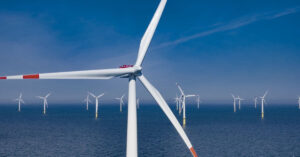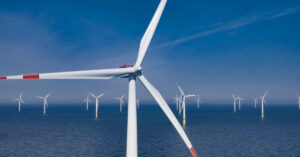
Oil Clean-Up Efforts Intensify After MV Ultra Galaxy Ship Breaks Further In Rough Weather
August 21, 2024
UK Invests $35 Million To Develop DRC’s First Deep Water Container Port
August 21, 2024

Bureau of Ocean Energy Management (BOEM), the United States Ocean Energy Agency, has granted the state of Maine the first floating offshore wind energy research lease in the United States.
The lease covers nearly 15,000 acres on the United States Outer Continental Shelf, is 28 nautical miles off Maine’s coast, and can accommodate up to 12 floating offshore wind turbines capable of generating 144 megawatts of renewable energy.
The research program is a joint venture between the State of Maine, the fishing community, the offshore wind industry and the wildlife experts.
The main focus of the research is to thoroughly assess the potential of floating offshore wind energy, including its environmental impacts and compatibility with existing ocean activities.
The findings will directly impact future commercial floating offshore wind initiatives in the region.
BOEM Director Elizabeth Klein states that floating offshore wind opens various opportunities to produce renewable energy in deeper water.
Maine Governor Janet Mills highlighted the initiative’s importance, saying that offshore wind energy gives Maine the opportunity to generate well-paid jobs, reduce reliance on fossil fuels, and combat climate change by reducing greenhouse gas emissions.
The research lease is part of the Biden-Harris administration’s effort to expand offshore wind energy. Since the administration’s start, the Department of the Interior has approved nine commercial offshore wind projects with a combined capacity of over 13 gigawatts, enough to power nearly 5 million homes.
The Department has also conducted five offshore wind lease auctions, including record-breaking sales off the coast of New York and the first-ever auctions on the Pacific Coast and Gulf of Mexico. Up to 12 additional lease sales are scheduled by 2028.
Maine’s application for the renewable energy research lease, submitted in October 2021, resulted in BOEM’s Determination of No Competitive Interest in March 2023.
After completing a Final Environmental Assessment, BOEM offered the lease to the State of Maine on May 24, 2024, finding no major environmental impacts.
As the lessee, Maine or its authorized operator will perform environmental and engineering research on the project. All findings will be made available to inform future planning, permitting, and construction of commercial-scale floating offshore wind projects.
The lessee must submit a Research Activities Plan to BOEM for environmental review per the National Environmental Policy Act, even though work on the research array won’t begin for some years.
Reference: BOEM
U.S. Approves First-of-its-Kind Floating Offshore Wind Energy Research Lease appeared first on Marine Insight – The Maritime Industry Guide
Source: Maritime Shipping News


